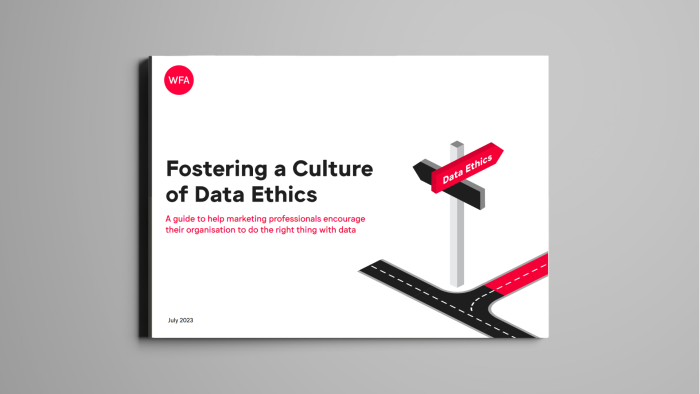Get analysis, insight & opinions from the world's top marketers.
Sign up to our newsletter.
CMOs say data ethics is a top priority but tend to overlook one crucial step: ensuring that their internal culture is rooted in the ethical and responsible use of data. WFA has developed a playbook to help brands bridge that gap.

Nine out of ten global CMOs agree that data ethics is a top priority for their organisation. This backing comes in response to widespread unease with the ways in which data is used in advertising and the mounting regulatory scrutiny on personal data-driven marketing.
As outlined in WFA’s 2022 CMO Guide to Data Ethics in Practice, building a culture of data ethics is fundamental to ensuring that organisations act consistently in the best interests of consumers and establish transparency, accountability and integrity in their marketing operations.
What we find, however, is an intention action gap. WFA research shows that only 41% of global CMOs say data ethics has become an integral part of their organisation’s culture.
To help close that near 50-point gap between ambition and reality, we have developed a first Data Ethics Playbook which provides guidance and support to brands as they look to build a culture rooted in the ethical use of data.
This playbook, developed in collaboration with 13 member organisations (AB InBev, Coty, ISBA, Johnson & Johnson, Reckitt, Red Bull, Kenvue, Kraft Heinz, Nestlé, P&G, Philips, Shell and Unilever), puts forward six practical recommendations brands can take to drive an ethical culture shift. These recommendations centre around:
Companies should create a harmonised narrative internally on the importance of responsible and ethical data use and promote data ethics as good for business, consumers and society at large.
Teams across functions should collaborate to define a set of data ethics principles which align with industry best-practice and their company values and bring them to life in the various functions dealing with data.
"At Kraft Heinz, we are fueled by our company values, and two of those values are: We Dare to Do Better Every Day, and We Do The Right Thing. As part of those values, we see culture change around data ethics principles as a necessity, not a luxury. It is comforting to know that we are not alone in the intricate maze of responsible data practices. For an organisation like ours, which is still in the journey of navigating the ethical complexities in a data-driven world, this toolkit could not have come at a better time. At Kraft Heinz, it is critical that our teams across the enterprise understand the importance of company-wide ethics principles and standards and know how to apply the governance in the work they do each day." – Nendra van Wielink-Mohamed, Associate Director, Global Media, Kraft Heinz
While creating dedicated functions to streamline data ethics internally may be an option to consider, all employees should contribute to the organisations’ collective efforts and understand their responsibilities for upholding ethics in the data-related decisions they take.
"The WFA Data Ethics Playbook provides a clear framework for addressing the complex and cross-disciplinary conversations that global organisations need to have to foster the cultural change needed to implement data ethics. This culture must be adopted at all levels of the organization and should not be the responsibility of a single person, rather shared across an interdepartmental team. This Playbook supports companies in setting clear expectations on responsibilities and ensuring that ethical implications are considered at all stages of marketing operations." – Catherina Kowsoleea, Head of Global Media Management, Philips
Decision-making structures, policies and processes should be adapted and reviewed to ensure ethical considerations are being adequately identified, addressed and integrated into all facets of business operations.
"At Unilever we have been on our journey for a few years now and have in place many of the practices identified in the playbook. Our work has been focussed around bringing our Data Ethics Principles to life, through deep dives and case studies, to show how the value of considering data ethics can support and add to their decision making. We have also helped our teams be armed with how to identify and address potential ethical considerations through a data ethics impact assessment. This toolkit will enable brands to quickly reflect on where they are today and pick the areas that are relevant to them. A culture change does not happen overnight so having this to help guide and craft that journey is something we wish we had available to us a couple of years ago." – Debbie Cartledge, Data & AI Ethics Strategy Lead & Olivia Murfitt, Data Ethics Senior Manager, Unilever
To align the organisation’s actions with its broader ethical aspirations, organisations should develop a set of tangible metrics and key performance indicators. These will serve as a litmus test for evaluating the effectiveness of the organisations’ overarching data ethics agenda.
Organisations should carry out regular and deep analyses aimed at quantifying the attitudes, behaviours and knowledge of data ethics across the organisation in order to benchmark progress and identify areas for improvement.
"At the heart of P&G’s business model is the consumer. Our approach to data ethics is strategic, innovative and focused on our Brands building trust with consumers in ways that contribute to long-term growth and value creation for P&G. The WFA Data Ethics Playbook provides hands-on tips for any brand looking to embark on this journey." - Bridge Einicke, Senior Brand Director Global Consumer Privacy & Brand Stewardship, Procter & Gamble
We will be publishing a series of documents designed to help marketing, media, policy and privacy professionals operationalise the recommendations in the 2022 CMO Guide to Data Ethics in Practice. The next playbook will be published in early 2024.

For more information or questions, please contact Gabrielle Robitaille at G.robitaille@wfanet.org